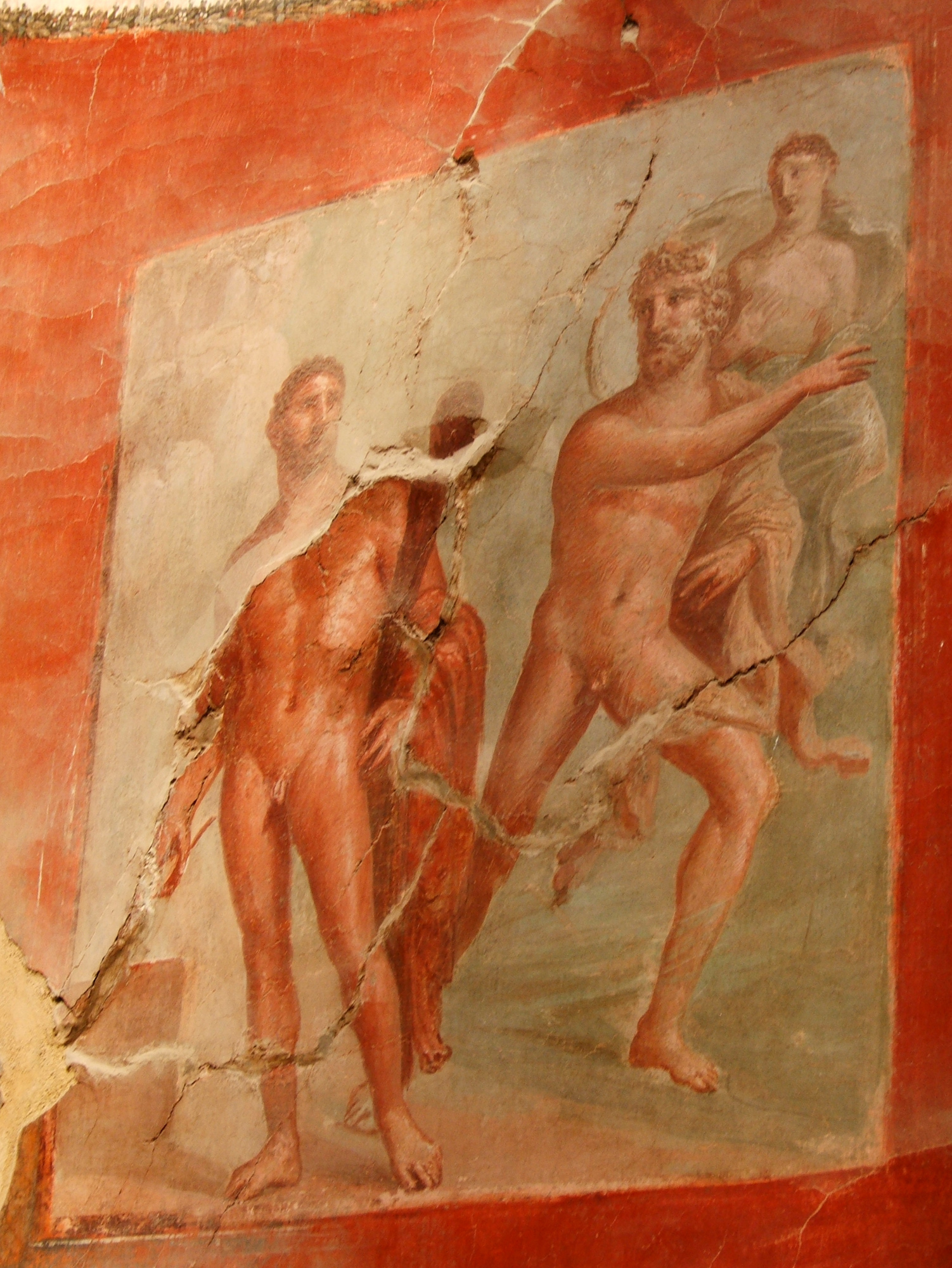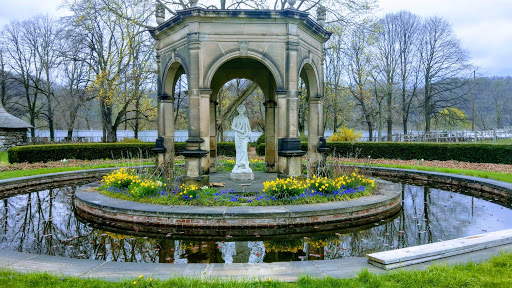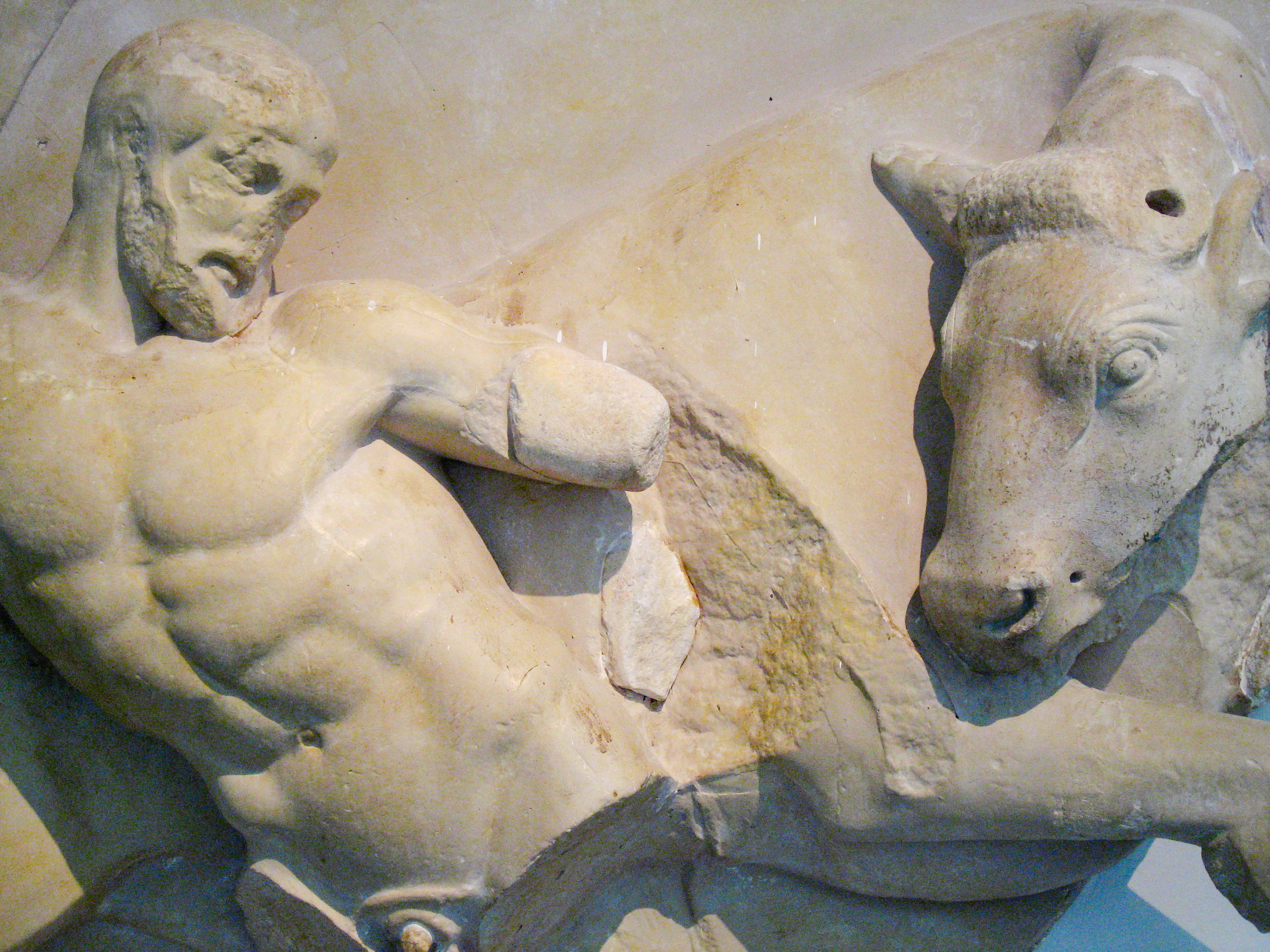|
Alcmaeon (mythology)
In Greek mythology, Alcmaeon (; Ancient Greek: Ἀλκμαίων ''Alkmaíōn''), as one of the Epigoni, was the leader of the Argives who attacked Thebes, taking the city in retaliation for the deaths of their fathers, the Seven against Thebes, who died while attempting the same thing. Family Alcmaeon was the son of Amphiaraus and Eriphyle and brother of Amphilochus. He had many progeny by different women including Clytius by Alphesiboea or Arsinoe, daughter of Phegeus; Amphoterus and Acarnan by Callirhoe, daughter of Achelous and lastly Amphilochus and Tisiphone by Manto, daughter of Tiresias. His son Clytius founded the Klytidiai, a clan of seers in Elis who interpreted the oracles of the Temple of Zeus at Olympia. Mythology The second Theban war Pindar's eighth Pythian ode relates a prophecy by Amphiaraus that the Epigoni will conquer Thebes, and that Alcmaeon will be the first through the gates. The mythographer Apollodorus, also states that the other ... [...More Info...] [...Related Items...] OR: [Wikipedia] [Google] [Baidu] |
Achelous
In ancient Greek religion and Greek mythology, mythology, Achelous (also Acheloos or Acheloios) (; Ancient Greek: Ἀχελώϊος, and later , ''Akhelôios'') was the god associated with the Achelous River, the largest river in Greece. According to Hesiod, he was the son of the Titans Oceanus and Tethys (mythology), Tethys. He was also said to be the father of the Siren (mythology), Sirens, several nymphs, and other offspring. Achelous was able to change his shape, and in the form of a bull, he wrestled Heracles for the right to marry Deianeira, but lost. He was also involved in the legend of the Argos, Peloponnese, Argive hero Alcmaeon (mythology), Alcmaeon. Etymology The name Ἀχελώϊος is possibly pre-Greek, its meaning is not entirely certain. Recent arguments suggest it is Semitic languages, Semitic in origin, with the initial Αχ- stemming from the Akkadian (language), Akkadian ''aḫu'' ("bank of the river"), or ''aḫû'' ("seashore") and the suffix -ελώἴ� ... [...More Info...] [...Related Items...] OR: [Wikipedia] [Google] [Baidu] |
Polynices
In Greek mythology, Polynices (also Polyneices) (; ) was the son of Oedipus and either Jocasta or Euryganeia and the older brother of Eteocles. When Oedipus was discovered to have killed his father and married his mother, Oedipus was expelled from Thebes, leaving Eteocles and Polynices to rule. Because of a curse put on them by their father, the two sons did not share the rule peacefully. During a battle for control over Thebes, the brothers killed each other. Mythology Oedipus's curse In the ''Thebaid'', the brothers were cursed by their father for their disrespect towards him on two occasions. The first of these occurred when they served him using the silver table of Cadmus and a golden cup, which he had forbidden. The brothers then sent him the haunch of a sacrificed animal, rather than the shoulder, which he deserved. Enraged, Oedipus prayed to Zeus that the brothers would die by each other's hand. However, in Sophocles' '' Oedipus at Colonus'', Oedipus desired to ... [...More Info...] [...Related Items...] OR: [Wikipedia] [Google] [Baidu] |
Harmonia (mythology)
In Greek mythology, Harmonia (; / harmoˈnia/, "harmony", "agreement") is the goddess of harmony and concord. Her Greek opposite is Eris and her Roman counterpart is Concordia. Harmonia is most well-known for her marriage to Cadmus and the many misfortunes that haunted her descendants, particularly those related to the fabled Necklace of Harmonia. Family Harmonia's parentage varies between accounts. She has most often been named as a daughter of the gods Ares and Aphrodite. Scholia on Homer, ''Iliad'' B, 494, p. 80, 43 ed. Bekk. as cited in Hellanicus' ''Boeotica'' Apollodorus3.4/ref> This would make her the sister of other mythological figures such as Aeneas, Phobos, and Eros. In other accounts, Harmonia was born in Samothrace to Zeus and the Pleiad Electra. In this telling, Harmonia would have been the sister of Dardanus and Iasion, who, under the instruction of Zeus, were the founders of mystic rites on Samothrace.Diodorus Siculus5.48.2/ref> Almost always, ... [...More Info...] [...Related Items...] OR: [Wikipedia] [Google] [Baidu] |
Thersander (Epigoni)
In Greek mythology, the name Thersander or Thersandros ( /θɜːrˈsændər, -ˈsɑːn-/; Ancient Greek: means 'bold man' derived from 'boldness, braveness' and 'of a man') was one of the Epigoni, who attacked the city of Thebes. This is in retaliation for the deaths of their fathers, the war of the Seven against Thebes, who had attempted the same thing. Family Thersander was the son of Polynices and Argia. He was succeeded by his son Tisamenus, whose mother was Demonassa. Mythology Thersander may have bribed Eriphyle with the robe of Harmonia so that she sent her son, Alcmaeon, to fight with him. His father did the same with the necklace of Harmonia, to convince her to send her husband with the original attackers. The attack of the Epigoni was successful, and Thersander became the king of Thebes. Thersander intended to fight for the Greeks during the Trojan War, but was killed by Telephus before the war began, while the Greeks had mistakenly stopped in Mysia. P ... [...More Info...] [...Related Items...] OR: [Wikipedia] [Google] [Baidu] |
Diodorus
Diodorus Siculus or Diodorus of Sicily (; 1st century BC) was an ancient Greek historian from Sicily. He is known for writing the monumental universal history '' Bibliotheca historica'', in forty books, fifteen of which survive intact, between 60 and 30 BC. The history is arranged in three parts. The first covers mythic history up to the destruction of Troy, arranged geographically, describing regions around the world from Egypt, India and Arabia to Europe. The second covers the time from the Trojan War to the death of Alexander the Great. The third covers the period to about 60 BC. ''Bibliotheca'', meaning 'library', acknowledges that he was drawing on the work of many other authors. Life According to his own work, he was born in Agyrium in Sicily (now called Agira). With one exception, antiquity affords no further information about his life and doings beyond his written works. Only Jerome, in his '' Chronicon'' under the "year of Abraham 1968" (49 BC), writes, "D ... [...More Info...] [...Related Items...] OR: [Wikipedia] [Google] [Baidu] |
Pindar
Pindar (; ; ; ) was an Greek lyric, Ancient Greek lyric poet from Thebes, Greece, Thebes. Of the Western canon, canonical nine lyric poets of ancient Greece, his work is the best preserved. Quintilian wrote, "Of the nine lyric poets, Pindar is by far the greatest, in virtue of his inspired magnificence, the beauty of his thoughts and figures, the rich exuberance of his language and matter, and his rolling flood of eloquence, characteristics which, as Horace rightly held, make him inimitable." His poems can also, however, seem difficult and even peculiar. The Athenian comic playwright Eupolis once remarked that they "are already reduced to silence by the disinclination of the multitude for elegant learning". Some scholars in the modern age also found his poetry perplexing, at least until the 1896 discovery of some poems by his rival Bacchylides; comparisons of their work showed that many of Pindar's idiosyncrasies are typical of archaic genres rather than of only the poet himsel ... [...More Info...] [...Related Items...] OR: [Wikipedia] [Google] [Baidu] |
Pausanias (geographer)
Pausanias ( ; ; ) was a Greek traveler and geographer of the second century AD. He is famous for his '' Description of Greece'' (, ), a lengthy work that describes ancient Greece from his firsthand observations. ''Description of Greece'' provides crucial information for making links between classical literature and modern archaeology, which is providing evidence of the sites and cultural details he mentions although knowledge of their existence may have become lost or relegated to myth or legend. Biography Nothing is known about Pausanias apart from what historians can piece together from his own writing. However, it is probable that he was born into a Greek family and was probably a native of Lydia in Asia Minor. From until his death around 180, Pausanias travelled throughout the mainland of Greece, writing about various monuments, sacred spaces, and significant geographical sites along the way. In writing his '' Description of Greece'', Pausanias sought to put together ... [...More Info...] [...Related Items...] OR: [Wikipedia] [Google] [Baidu] |
Temple Of Zeus, Olympia
The Temple of Zeus was an ancient Greek temple in Olympia, Greece, dedicated to the god Zeus. The temple, built in the second quarter of the fifth century BC, was the very model of the fully developed classical Greek temple of the Doric order.bTemple of Zeusat Archaeopaedia, Stanford University Construction The Temple of Zeus was built on an already ancient religious site at Olympia. The Altis, an enclosure with a sacred grove, open-air altars and the tumulus of Pelops, was first formed during the tenth and ninth centuries BC. The temple was constructed between and 456 BC. The temple was of peripteral form with a frontal pronaos (porch), mirrored by a similar arrangement at the back of the building, the opisthodomos. The building sat on a crepidoma (platform) of three unequal steps, the exterior columns were positioned in a sixbythirteen arrangement, two rows of seven columns divided the cella (inner chamber) into three aisles. An echo of the temple's original appearance ... [...More Info...] [...Related Items...] OR: [Wikipedia] [Google] [Baidu] |
Ancient Elis
Elis () or Eleia (; ; Elean: ; ) is an ancient district in Greece that corresponds to the modern regional unit of Elis. Elis is in southern Greece on the Peloponnese, bounded on the north by Achaea, east by Arcadia, south by Messenia, and west by the Ionian Sea. Over the course of the archaic and classical periods, the '' polis'' "city-state" of Elis controlled much of the region of Elis, most probably through unequal treaties with other cities; many inhabitants of Elis were Perioeci—autonomous free non-citizens. Perioeci, unlike other Spartans, could travel freely between cities. Thus the polis of Elis was formed. The local form of the name was Valis, or Valeia, and its meaning, in all probability was, "the lowland" (compare with the word "valley"). In its physical constitution Elis is similar to Achaea and Arcadia; its mountains are mere offshoots of the Arcadian highlands, and its principal rivers are fed by Arcadian springs. According to Strabo, the first ... [...More Info...] [...Related Items...] OR: [Wikipedia] [Google] [Baidu] |
Bibliotheca (Pseudo-Apollodorus)
The ''Bibliotheca'' (Ancient Greek: ), is a compendium of Greek mythology, Greek myths and heroic legends, genealogical tables and histories arranged in three books, generally dated to the first or second century AD. The work is commonly described as having been written by Apollodorus (or sometimes Pseudo-Apollodorus), a result of its false attribution to the 2nd-century BC scholar Apollodorus of Athens. Overview The ''Bibliotheca'' of Pseudo-Apollodorus is a comprehensive collection of myths, genealogies and histories that presents a continuous history of Greek mythology from the earliest gods and the origin of the world to the death of Odysseus.. The narratives are organized by genealogy, chronology and geography in summaries of myth. The myths are sourced from a wide number of sources like early epic, early Hellenistic poets, and mythographical summaries of tales. Homer and Hesiod are the most frequently named along with other poets.Kenens, Ulrike. 2011. "The Sources of Ps.-A ... [...More Info...] [...Related Items...] OR: [Wikipedia] [Google] [Baidu] |
Tiresias
In Greek mythology, Tiresias (; ) was a blind prophet of Apollo in Thebes, Greece, Thebes, famous for clairvoyance and for being transformed into a woman for seven years. He was the son of the shepherd Everes (mythology), Everes and the nymph Chariclo. Tiresias participated fully in seven generations in Thebes, beginning as advisor to Cadmus, the founder of Thebes. Mythology Eighteen allusions to mythic Tiresias, noted by Luc Brisson, fall into three groups: the first recounts Tiresias' sex-change episode and later his encounter with Zeus and Hera; the second group recounts his blinding by Athena; the third, all but lost, seems to have recounted the misadventures of Tiresias. Sex-change On Mount Cyllene in the Peloponnese, Tiresias came upon a pair of copulating snakes and hit them with his stick, which displeased goddess Hera who punished Tiresias by transforming him into a woman. As a woman, Tiresias became a priestess of Hera, married and had children, including his daugh ... [...More Info...] [...Related Items...] OR: [Wikipedia] [Google] [Baidu] |





